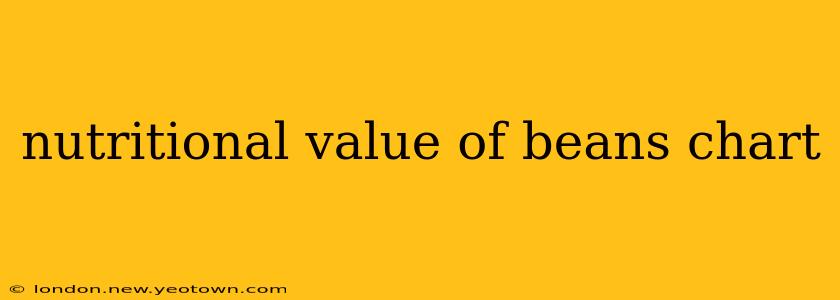The Mighty Bean: A Nutritional Powerhouse Unveiled
Beans! Just the word conjures up images of hearty stews, vibrant salads, and comforting chili. But beyond their culinary versatility, beans are nutritional superstars, packing a punch of essential nutrients that often go unsung. This comprehensive guide will delve into the nutritional value of beans, answering common questions and revealing why they deserve a prominent place in your diet.
We'll explore the different types of beans and their unique nutritional profiles, highlighting the vitamins, minerals, and fiber that make them so beneficial. Get ready to discover the surprising health benefits hidden within these humble legumes!
What are the nutritional benefits of different types of beans?
This is a fantastic question, and the answer is multifaceted! The nutritional profile of beans varies slightly depending on the type. However, most beans share a core set of impressive nutrients. Generally, beans are excellent sources of:
- Protein: Beans are a fantastic source of plant-based protein, making them an ideal choice for vegetarians and vegans. They provide all the essential amino acids, although not always in the same proportions as animal protein.
- Fiber: This is where beans truly shine! They're brimming with both soluble and insoluble fiber, contributing to digestive health, promoting regularity, and helping to lower cholesterol.
- Iron: Beans contain iron, an essential mineral for red blood cell production and oxygen transport. Note that the bioavailability of iron in plant-based sources is often lower than in animal products. Pairing beans with vitamin C-rich foods can enhance iron absorption.
- Vitamins and Minerals: Different beans offer a variety of vitamins and minerals, including folate (important for cell growth and development), potassium (essential for maintaining healthy blood pressure), magnesium (involved in hundreds of bodily processes), and zinc (crucial for immune function).
Let's look at some examples:
- Kidney Beans: High in protein and fiber, excellent source of folate and manganese.
- Black Beans: Rich in antioxidants, fiber, and iron.
- Pinto Beans: Good source of protein, fiber, and molybdenum.
- Chickpeas (Garbanzo Beans): High in protein and fiber, also a good source of folate and manganese.
- Lentils: While technically a legume and not a bean, lentils deserve a mention! They are incredibly nutritious, boasting high levels of protein and fiber, along with iron and folate.
Are beans good for weight loss?
Absolutely! Beans are incredibly filling due to their high fiber and protein content. This helps you feel satiated for longer, reducing overall calorie intake and potentially aiding in weight management. Furthermore, the fiber in beans can help regulate blood sugar levels, preventing energy crashes and cravings.
What are the potential downsides of eating beans?
While generally very healthy, some people experience digestive discomfort after eating beans, such as gas and bloating. This is primarily due to the raffinose family of oligosaccharides, which are complex sugars that the body has difficulty digesting. Gradually increasing your bean intake and choosing well-cooked beans can mitigate these effects. Soaking beans before cooking can also help reduce gas.
How many beans should I eat per day?
There's no single magic number. The amount of beans you should consume daily depends on individual factors like your overall calorie needs, activity level, and health goals. However, incorporating beans into your diet several times a week is a great way to boost your nutrient intake and reap the health benefits. Aim for a balanced diet that includes a variety of fruits, vegetables, whole grains, and lean protein sources, with beans playing a starring role.
How can I incorporate more beans into my diet?
Beans are surprisingly versatile! You can add them to soups, stews, salads, chili, burritos, and countless other dishes. Try experimenting with different bean varieties and cooking methods to find your favorites. You can even make delicious bean dips or spreads! The possibilities are endless.
This journey into the nutritional world of beans showcases their remarkable contributions to a healthy lifestyle. From bolstering energy levels to supporting digestive health, beans are truly a nutritional treasure. So, embrace these humble legumes and reap the plentiful rewards!

